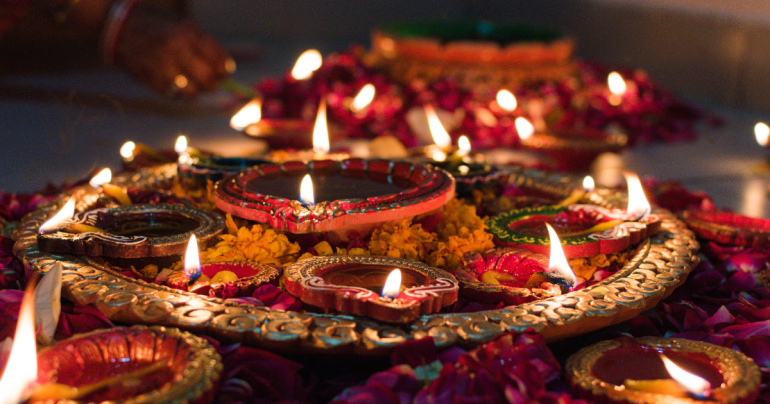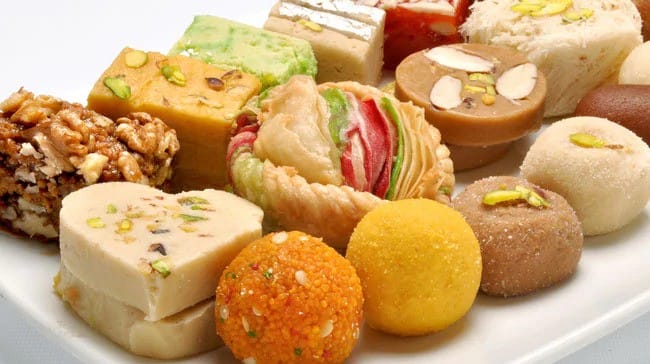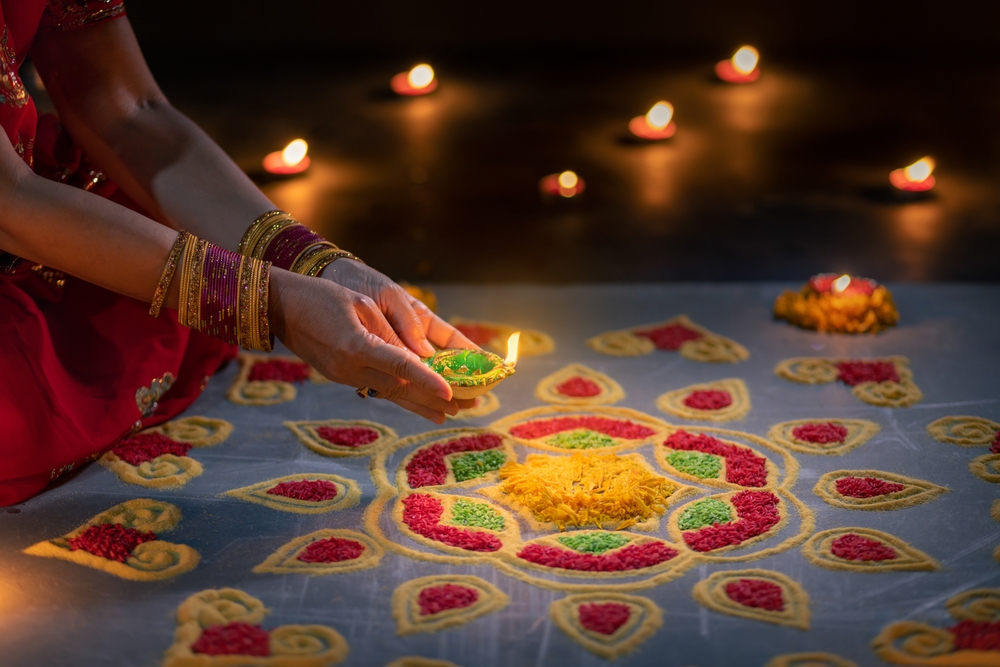
દિવાળી, પ્રકાશનો તેજસ્વી તહેવાર, ભારતીય સંસ્કૃતિમાં એક પ્રિય સ્થાન ધરાવે છે, જે એકતા, અંધકાર પર વિજય અને સમૃદ્ધિની શોધનું પ્રતીક છે. જ્યારે દિવાળીનો સાર સાર્વત્રિક છે – આનંદ અને ઉત્સાહથી ઉજવવામાં આવે છે – દરેક પરિવાર આ ઉત્સવોમાં પોતાની રોનક ઉમેરે છે, અનન્ય પરંપરાઓ, રિવાજોનું સન્માન કરે છે અને, અલબત્ત, વિવિધ મીઠાઈઓનો આનંદ માણે છે. આ તહેવાર ઘણીવાર પાંચ દિવસમાં ઉજવવામાં આવે છે, જેમાં દરેક દિવસનું પોતાનું મહત્વ હોય છે, ધનતેરસથી ભાઈબીજ સુધી. ચાલો આ ઉત્સવની મોસમના હૃદયમાં એક સફર કરીએ, ભારતભરના પરિવારો પ્રિય ધાર્મિક વિધિઓ, પરંપરાગત મીઠાઈઓ અને ઊંડા મૂળવાળા રિવાજો દ્વારા દિવાળી કેવી રીતે ઉજવે છે તેની વિવિધ છતાં એકબીજા સાથે જોડાયેલા રીતોની શોધ કરીએ.
એક વૈવિધ્યસભર મોઝેક
દિવાળી વિવિધ ધર્મો અને પૃષ્ઠભૂમિના પરિવારો દ્વારા ઉજવવામાં આવે છે, દરેક પરિવાર પોતાના વારસાને પ્રતિબિંબિત કરતા અનોખા રિવાજો લાવે છે.
ઉત્તરીય પરિવારોમાં, દિવાળી ભગવાન રામ, પત્ની સીતા, ભાઈ લક્ષ્મણ અને હનુમાનના રાવણને હરાવીને અયોધ્યા પાછા ફરવાની ઉજવણી કરે છે. આ ઉજવણીમાં લક્ષ્મી પૂજાનો પણ સમાવેશ થાય છે, એક ધાર્મિક વિધિ જેમાં પરિવારો ધનની દેવીને પ્રાર્થના કરવા માટે ભેગા થાય છે, અને આગામી વર્ષમાં સમૃદ્ધિ માટે આશીર્વાદ માંગે છે.
દક્ષિણ ભારતમાં ઘણા પરિવારો નરક ચતુર્દશીનું સન્માન કરીને ઉજવણી કરે છે, જે ભગવાન કૃષ્ણ દ્વારા રાક્ષસ નરકાસુરના પરાજયનું પ્રતીક છે. બંગાળમાં, આ તહેવાર કાલી પૂજા તરીકે ઉજવવામાં આવે છે, જ્યાં લોકો તેમના પૂર્વજોનું સન્માન કરવા માટે 14 માટીના દીવા પ્રગટાવે છે અને દેવી કાલીની પૂજા કરે છે. શીખ પરિવારોમાં, તેઓ મુઘલ જેલમાંથી ગુરુ હરગોવિંદની મુક્તિને ચિહ્નિત કરવા માટે બંદી છોર દિવસ તરીકે ઉજવે છે જ્યારે જૈન પરિવારોમાં, તેઓ 24 મા તીર્થંકર ભગવાન મહાવીરના નિર્વાણની ઉજવણી માટે ઉજવણી કરે છે.
આ તહેવાર દરમિયાન કૌટુંબિક રિવાજો પૂજાથી આગળ વધે છે, જેમાં તાજા ફૂલો, લાઇટ્સ, દીવાઓ અને રંગબેરંગી રંગોળીઓથી ઘરોને સજાવવાથી લઈને કૌટુંબિક મેળાવડાનું આયોજન અને ઘણા પરિવારોમાં ફટાકડા ફોડવા સુધીની પ્રવૃત્તિઓનો સમાવેશ થાય છે.
દિવાળી ઉજવણીનું હૃદય
દિવાળી અને મીઠાઈઓ અવિભાજ્ય છે. સમગ્ર ભારતમાં, પરિવારો મીઠાઈ તરીકે ઓળખાતી પરંપરાગત મીઠાઈઓની પસંદગી તૈયાર કરવા અથવા ખરીદવા માટે ભેગા થાય છે, જે પ્રેમના પ્રતીક તરીકે પરિવારો અને મિત્રો સાથે વહેંચવામાં આવે છે. દરેક પ્રદેશ અને દરેક પરિવારમાં ચોક્કસ મનપસંદ મીઠાઈઓ હોય છે જે ભાવનાત્મક મૂલ્ય ધરાવે છે.

લાડુ: દિવાળીની સૌથી સાર્વત્રિક મીઠાઈ, લાડુ વિવિધ શૈલીઓમાં બનાવવામાં આવે છે – બેસન લાડુ, નારિયેળના લાડુ, બુંદીના લાડુ – દરેક પરિવારની પોતાની રેસીપી હોય છે.
બરફી: કન્ડેન્સ્ડ મિલ્ક, ખાંડ અને એલચી કે પિસ્તા જેવા સ્વાદમાંથી બનેલી, બરફી એ દિવાળીની એક સામાન્ય વાનગી છે જેમાં પરિવારો આધુનિક સ્વાદ માટે ચોકલેટ બરફી અથવા મેંગો બરફી જેવા વિવિધ પ્રકારો બનાવવાનો આનંદ માણે છે.
ઘણા દિવાળી તહેવારોમાં મુખ્ય વાનગી, ગુલાબ જામુન તેના મોંમાં ઓગળી જાય તેવી રચના અને મીઠા ચાસણીના સ્વાદ માટે પ્રિય છે. જ્યારે ભારતના દક્ષિણ ભાગોમાં, મૈસુર પાક અને અધિરસમ જેવી મીઠાઈઓ ખાસ કરીને લોકપ્રિય છે. પૂર્વમાં, નારીકોલ લાડુ (નાળિયેરના લાડુ) અને સંદેશ ઘણીવાર દિવાળીના ફેલાવાનો ભાગ હોય છે. મીઠાઈઓમાં વિવિધતા ભારતના સમૃદ્ધ રાંધણ વારસાને પ્રતિબિંબિત કરે છે, જ્યાં દરેક મીઠાઈ ફક્ત એક સ્વાદિષ્ટ વાનગી કરતાં વધુ છે; તે પરિવારના સાંસ્કૃતિક મૂળનું પ્રતીક છે.
દિવાળીનો અમર ઉત્સાહ
દિવાળી એક એવો પ્રસંગ છે જે પરિવારો અને સમુદાયોને એકસાથે લાવે છે, ખુશીઓ વહેંચવા માટે મીઠાઈઓ અને નાની ભેટોની આપ-લેથી લઈને સામાજિક મેળાવડાને પ્રાથમિકતા આપવા અને સામાજિક બંધનો બનાવવા માટે વિવિધ પૃષ્ઠભૂમિ અને પ્રદેશોના લોકો સાથે દિવાળી પાર્ટીઓનું આયોજન કરવા સુધી.
તહેવારોની ઉજવણીમાં નવા પરિમાણો ઉમેરતા, દિવાળી એ દાન આપવાનો પણ એક પ્રસંગ છે, જ્યાં ઘણા પરિવારો તેમના બજેટનો એક ભાગ સામાજિક કાર્યોમાં યોગદાન આપવા માટે અલગ રાખે છે, જેમ કે વંચિતોને ખોરાક, કપડાં અથવા ભેટોનું દાન.
આધુનિક વળાંક સાથે દિવાળી: 2024 માં અનુકૂલન
ટકાઉપણું અને સ્વાસ્થ્ય પ્રત્યે સભાનતા પર વધતા ધ્યાન સાથે, દિવાળી 2024 પરંપરાગત પ્રથાઓમાં પરિવર્તન જોઈ રહી છે. કેટલાક પરિવારો બાયોડિગ્રેડેબલ સામગ્રીમાંથી બનાવેલા પર્યાવરણને અનુકૂળ દીવા પસંદ કરી રહ્યા છે, જ્યારે અન્ય લોકો ઓછી ખાંડવાળી અથવા ઓર્ગેનિક ઘટકોમાંથી બનેલી મીઠાઈઓ પસંદ કરી રહ્યા છે અને કેટલાક ભેટ તરીકે ત્વચા સંભાળ અથવા આરોગ્ય સંભાળના ઉત્પાદનોનો પણ વિકલ્પ પસંદ કરી રહ્યા છે. અંતરથી અલગ થયેલા પરિવારો માટે, વર્ચ્યુઅલ દિવાળી પૂજા અને ઓનલાઈન મીઠાઈ ઓર્ડર સામાન્ય બની ગયા છે, જે પરિવારોને દૂરથી પણ સાથે ઉજવણી કરવામાં મદદ કરે છે. આ ઉત્સવની ઉજવણી સંયુક્ત પરિવારોથી વિભાજિત પરિવારોમાં પરિવર્તનનો પણ સાક્ષી છે.
ઘણા શહેરી પરિવારોએ પર્યાવરણને અનુકૂળ પ્રથાઓ પણ અપનાવી છે, જેમ કે પ્રદૂષણ ઘટાડવા માટે ફટાકડા ફોડવાથી દૂર રહેવું અથવા ડિજિટલ દિવાળી પાર્ટીઓનું આયોજન કરવું. દિવાળી પરનો આ આધુનિક વળાંક ફક્ત તહેવારની ભાવનાને જ સાચવતો નથી પણ તેને સમકાલીન મૂલ્યો સાથે પણ સંરેખિત કરે છે, ટકાઉપણું અને આરોગ્ય પર ભાર મૂકે છે.

રિવાજો, ધાર્મિક વિધિઓ અને મીઠાઈઓમાં વિવિધતા હોવા છતાં, દિવાળીનો સાર પરિવારોમાં સમાન રહે છે – પ્રેમ, આનંદ અને સમૃદ્ધિની ઉજવણી. પરિવારો દીવા પ્રગટાવવા, મીઠાઈઓની આપ-લે કરવા અને સદીઓ જૂની પરંપરાઓનું સન્માન કરવા માટે ભેગા થાય છે, તે દિવાળીની ભાવનાને મજબૂત બનાવે છે, જે તેને ખરેખર બધાને એક કરે છે તે તહેવાર બનાવે છે.